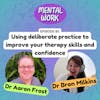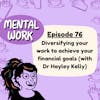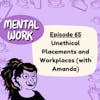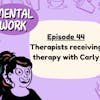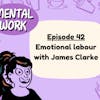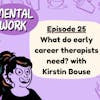End-of-year burnout and developing your burnout prevention plan

Bron unpacks what end-of-year burnout looks like for therapists and her 🔥 red hot 🔥strategies for preventing burnout (book your leave for next year NOW!).
LINKS
- Comic by Gemma Correll on burnout: https://www.instagram.com/p/CbAi-OrrSBw/
THE END BITS
Mental Work is your companion to early-career psychology, hosted by Dr Bronwyn Milkins.
Love the podcast? Reviews really help! Leave a rating & review on Apple and Spotify.
Keep the pod alive by joining our Patreon for $2 a month 😎
Support the show by buying me a virtual coffee! ☕
Have an early-career question? Send it to our mailbag!
Facebook / Instagram / YouTube (with captions & transcript) / Website / Apply to be a guest / Email Bron
CREDITS
Producer: Michael English
Music: Home
See omnystudio.com/listener for privacy information.
[00:00:00] Hey, mental workers. I'm Dr. Bronwyn Milkins, and you're listening to the Mental Work Podcast, your companion to early career psychology.
[00:00:14] Today, we are talking about burnout and specifically the burnout that happens towards the end of the year. We'll also be talking about your burnout prevention plan for next year, which is in this case 2024. I know it's gone so fast, hasn't it?
[00:00:30] First, did you know that early career psychologists are particularly at risk of burnout? Yep, there's a few research articles which confirm this and it sucks. As an early career psychologist myself, I am no stranger to burnout. And listeners, I have a confession to make, which is I've actually been burnt out for about six months now.
[00:00:55] It's been hard, not going to lie. And it's only now that I feel able to talk about it and I'm actually in a recovery stage rather than just going through the burnout.
[00:01:08] It's much better than it was last year. Last year I was a bit burnt out as well and I needed to cancel client sessions because I just felt like I couldn't do my work well. This year I've managed to maintain the facade of doing well at work whilst also dealing with exhaustion in the background. I don't know if that's actually better.
[00:01:32] But the main thing I've noticed in myself, and this is consistent with the research literature, is that emotional exhaustion. Emotional exhaustion, for me, looks like feeling very tired. So really, it doesn't take a lot to tire me out and even after one client session, I noticed as my burnout was getting worse, that I would just feel completely wiped out and I'd need to take a lie down on the couch in my office between each client.
[00:01:58] I also had another symptom of burnout, which is feeling really crummy about my work. The technical term for that is decrease in feelings of personal accomplishment and I was just feeling like I wasn't doing good work. I felt like I wasn't having much success with clients and I wasn't able to see the progress and achievements that I was making.
[00:02:22] I think my physical health has also suffered. I was getting really bad neck pains for the past few months and I genuinely think it was because I was leaning forward too much in my chair during therapy plus nodding too vigorously. You know how with dogs there's like happy tail syndrome and they can wag their tails too much?
[00:02:42] I feel like there's an equivalent for therapists, which is nodding too much and stretching your neck in awkward directions. So I was dealing with pain, I was dealing with exhaustion, and I was feeling really crap about my skills as a therapist. The reason why I'm sharing this with you is because I know more than anything that I'm not alone.
[00:03:03] Like I said, early career psychs are at high risk of burnout , and when we've been trying to put on a facade and mask our emotions for the whole year, sometimes that can unravel towards the end of the year. So if what I'm describing resonates with you, then this episode will be very important because we'll be talking about preventing that for 2024.
[00:03:25] There are some other signs of burnout, particularly for therapists. They can include, you feel totally overworked. You have no control over your work life. You have no control over your workload, so you feel like you're swimming against the tide. This was a big one for me, actually. I really began to resent emails. Not that I didn't resent them beforehand, but I actually really hated them. It's like I empty my inbox one day and then the inbox is full again two hours later.
[00:03:56] Another sign is that you feel you're unable to keep your head above water. You feel helpless and hopeless. You're dragging yourself to work. You can't face seeing another client. You might have strong negative attitudes towards clients.
[00:04:09] For me in the past, this negative attitude towards clients has manifested in me jumping to conclusions that a client must be manipulating me or that they're being untruthful.
[00:04:21] Another sign is you may have reduced satisfaction with your work. You're negative or snarky to your colleagues. You've got reduced enthusiasm for anything, that includes work stuff, but outside of work stuff as well. The somatic symptoms, so back pains, neck pains, headaches, stomach aches. You become disillusioned with the healthcare system, not that this can't happen outside of burnout, but you know, all of these things together.
[00:04:48] You can't see success, you believe that you can't help people and you feel like a failure, you're dissatisfied with your job, you started looking for other jobs or thinking about resigning and your personal life suffers. So one or more of these things gives us our collection of burnout symptoms.
[00:05:07] And not only is burnout really distressing, but it can also take a really long time to recover from. So in my opinion, it would be best to prevent it and feel good about yourself and your work and your outside of work life than to go through it and have to recover. It's a real bitch to recover from, as I'm sure lots of people listening to this know.
[00:05:29] I think it's worth pointing that out because quite often we don't take burnout seriously. We'll talk to our clients about burnout and really empathize with them and see the effects of chronic stress on our clients, but for us, we seem to think you're not working hard enough. Look how far behind everyone else you are.
[00:05:48] Punch the clock, jump through more hoops, stretch yourself thinner, skip your lunch, no resting, you don't deserve a break, really feel that burnout.
[00:05:57] And these thoughts are really summarized well in a comic by Gemma Correll, and I'll link to that in the show notes. But yeah, we can we push through our burnout and make it worse for ourselves because somehow we think that we are different to everyone else when it comes to burnout and that it shouldn't affect us or that we should be able to manage it.
[00:06:17] And we all know that shoulds place unrealistic expectations on ourselves that are usually quite unfair and if they're not unfair, they're plain unkind.
[00:06:28] So if you are experiencing any of these signs and symptoms and you're noticing the compulsion to keep on going and get through it. Let me say to you, don't. Stop. Reassess. You deserve to have health. You deserve to feel good about yourself. You deserve not to have a syndrome that is highly correlated with depression and anxiety.
[00:06:53] And I'm saying that as much to you as I am saying it to myself.
[00:06:57] So, let's have a look at how we can prevent burnout. And for this, I grabbed up my Word document that was titled Burnout Prevention Plan. So I've had this since the start of starting my private practice. I knew for myself that burnout has been a risk for me since I was like six years old, my mom will always say that by the end of the year, I was always tired out.
[00:07:19] And I think going into the workforce and having a high stress job, like being a psychologist, has only exacerbated that inner tendency that I already had. So I knew at the very start that I needed to have a plan to prevent this. That doesn't mean that I stuck to the plan, but look, I've tried as best I can and I have implemented a few things. Okay. So don't tell my mom.
[00:07:44] So here are the things that I do to prevent burnout.
[00:07:48] The first thing is I commit to only booking four clients max per day. I've talked about this on another episode, how I came to this four clients per day thing. Essentially what I've noticed is that it brings me the greatest ability to keep doing what I do.
[00:08:04] If I have multiple five or six client days in a row, I notice that the burnout creeps in. If I could do four and a half sessions. That would probably be okay as well, but given that we don't really do that as therapists, for me, it's four clients max per day.
[00:08:23] There can be a degree of shame, which I think is unwarranted and it comes back to you should be working harder associated with only doing four clients a day. But honestly, it's, it's what works and if what works is seen as weak or not working hard enough, then surely the problem is with that standard rather than us. I don't think we should be drawing ourselves into burnout to meet a capitalistic standard.
[00:08:55] Thing number two I do for preventing burnout is I only book clients within my pre created appointment slots. I don't change appointment slots to suit clients because I've arranged the timing for a reason, which is usually to allow for rest, or admin, or writing reports, or just napping on my couch.
[00:09:17] I've found that this one is really important to stick to, because soon enough you'll find yourself booking sessions at six o'clock and negotiating those times with clients takes time, takes energy, and can create resentment for you.
[00:09:33] This takes some practice to get good at. I find the simplest way to say to clients who are wanting a slot that you theoretically could do, but it's not within your predefined appointment slots is to say, sorry, I'm not available then. That's it. We just need to say, you're not available. You don't need to give any other excuse. It's just, I'm sorry, I'm not available then.
[00:09:56] And if they can't make that time and you're worried because then they won't be able to come for another two weeks. They will be okay. You can make plans for those two weeks that they're unable to come to appointments. But remember, you're the one delivering the therapy. You are important. We need to make sure that you're okay so that you can actually show up to work and do good work with people.
[00:10:20] Burnout prevention idea number three. Is I have a 15 minute break between clients. I've had to experiment with how much break I have between clients, because on the one hand, if I have too much of a break between clients, then I find that I can go over with sessions and then I find if I have too little, then I get stressy.
[00:10:41] So I found that 15 minutes is a perfect amount of time because then it prompts me to be like, I have to go, so we have to finish the session, but then I don't lose steam.
[00:10:51] Okay, I'll tell you what I do honestly, is I book sessions at 9 o'clock, 10 o'clock, 11. 15 a. m., 2 o'clock, 3. 15 and the reason I do 9 o'clock, 10 o'clock is because I usually find that I'm on a roll , and I'm very dedicated to finishing sessions on time early in the morning, so I'll be like 9 to 9.50, got it, I'm great and then I'll do the 10 o'clock. I have a two o'clock because I like having a long break and then if I need to write a report then I can do it at one o'clock, whereas I know if I said to myself I'll leave it to the last thing of the day, it will not get done, I will leave work early. Even though I am my own boss, I'll be like, I'm not staying here for another hour to do a report. So I have to force myself by scheduling my diary to do it.
[00:11:39] And the reason why I have five appointment slots is because sometimes I do book five clients knowing that one usually cancels or reschedules, so I usually do end up with four. And then on other days, I only book four clients and then sometimes I know which clients tend to, like they will definitely show up.
[00:12:01] And so I schedule my books like that. I've also got the ability to block out time once I hit four clients. So I offer five appointment slots, but once I hit four clients, then I'll block out, say the 3:15 that's left over. And then that's not available in my calendar.
[00:12:18] Burnout prevention idea number four, I aim to complete all notes and tasks on the day of the appointment before I leave work. And I say this with a rising intonation, because when I'm burnt out, I find this really difficult and that's one of my signs of burnout, that I don't finish my notes on the day and that they build up and then a week later I'm finishing the previous week's notes, which is obviously not great.
[00:12:42] But on the days that I do finish all my notes, I feel on top of the world. I'm like, fuck yes, I have, I have like run a marathon. I am amazing. So it's really good to be able to do that. And if you are struggling to get all your notes done on the day, I would encourage you to have a look at how much you're writing for your notes.
[00:13:02] And you can refer to my episode that I did quite early on in the podcast, which is called note taking doesn't have to be dreadful. Because for me, my notes take me between three and five minutes at the most. They take me a bit more if I have to write in suicide risks or other risks or say why I did something clinically, but most of the time they are very quick and they are summaries of what we've done in the session, how the person appeared, so mental state examination, and then what we're doing for next session.
[00:13:34] Burnout prevention plan idea number five. I book a week off every six weeks. So that means I have six weeks of therapy and then I book another week off. If you have not planned your time off for 2024, do it now. Pause the episode. Go do it now. Just block out time in your calendar. You will thank me later.
[00:13:54] There has never been a week where I have booked off and I've been like, Oh, I really wish I could have worked that week. It has always been like, thank fuck past Bronwyn booked that off in the calendar. And if you really desire to work during that week that you have booked off, you can do so.
[00:14:13] But having it off means that you've already protected yourself, and I can already hear some people, maybe if you come to psychology as a second career, or you've really got the nine to five, four weeks off a year ingrained in you, they might bring up some negative thoughts about yourself, such as you're being lazy.
[00:14:34] And remember, this ties into the mindset that you should be pushing through. For me, I need to protect my wellbeing, and I have loved having every seventh week off.
[00:14:46] Burnout prevention plan idea number six is minimize all admin processes. So I've worked really hard to refine my admin so that it is as minimal as possible. I've got lots of processes set up that are automatic or that are really quick and it really does help. If you are unable to minimize your admin processes, do seek assistance or If you are employed in a group practice or some other type of organization where somebody manages your admin and you feel like it's too much admin, problem solve that shit and make sure that your admin can be as minimal as possible.
[00:15:26] Okay, those are the mainstays of my burnout prevention plan, but I've added some extra ones just this morning, actually. And yeah, I feel like my burnout prevention plan was very, it was pretty basic. It was focused on ensuring that I have rest and that I don't overwork, but it really wasn't acknowledging, I guess, the other components of burnout.
[00:15:47] So let me tell you the things that I've added. One of the things I've added has been review the success you've had. So take a step back, have a look at how far you've come as a therapist and recognize that what was hard a year ago, six months ago, one month ago, you are doing now with much more ease, you are making progress in your career and in your therapeutic abilities or your abilities in whatever capacity you work in. And that's something to be proud of.
[00:16:18] I would also encourage you to try and look for and find positive feedback from clients and your referrers or the organizations that you work for. I found that looking for this has provided a massive boost. One of the things I do in my private practice is that I have a form which is "anytime feedback".
[00:16:38] And clients can click on this link and provide me a feedback and they do use it pretty frequently. I've got an automatic email that goes out after the sixth session where I ask them for that feedback and they can tell me things that I've done well or things that they want to see improvement on. When I have a look back at those feedback forms, I can see that there's really positive comments and it makes me feel good and it makes me remember that clients really value the work that we do and the work that I do is good and it does make a difference. So it really boosts me and really draws me out of my negative mindset, which is being really crummy to myself and being "like you're crap at what you do".
[00:17:16] I also remember the Feedback I've gotten from referrers. So in the past month, I've had feedback from a referrer saying that I'm the psychologist they get the best feedback about and that made my week and it still makes me really happy to think about.
[00:17:36] Another burnout prevention thing is to have a way of processing what has happened to clients that you can work through in your head. So with clients, they tell us about the injustices they have faced, the trauma that they have endured. Some clients tell us about the negative experiences they've had with other professionals or their response to global events.
[00:17:58] These are really hard things to process because we're processing them as well. Having a way of processing what has happened to clients and the emotional burden that that creates for us is really important, I've realized. So you can process what has happened to clients in supervision, in peer supervision with colleagues. And you can have a writing practice where you do journal and reflect on this. I think it's really important.
[00:18:29] Another burnout prevention idea I've had is to have a way of connecting deeply with something outside of work that can consume your focus and engage your senses. So like connecting with nature or creative expression.
[00:18:43] I found that this has been instrumental in helping me recover from burnout. I've recently got back into sewing clothes and it is really, really enjoyable. I can literally put on my headphones, not talk to anybody for a few hours and focus on touching fabric, cutting, measuring, sewing, fitting clothes. It's really fun and I've really enjoyed doing all of those things and I've also enjoyed being out in nature. So I've been going for lots more walks and really taking my time to engage with my surroundings. So really looking at flowers, looking at trees, and being like, that's a dope tree. I love that flower. It's been really cool.
[00:19:27] Okay. My next addition to the burnout prevention plan is if you are in a shit workplace or an unsupportive supervisory relationship, don't choose suffering my friends. Meet reality and problem solve it. So yeah, I'm encouraging you. Don't stay stuck in suffering. Be like, "this is crap". Don't be like. I'll wait and see if it improves. You have already waited to see if it improves. Take action, problem solve that shit, go work it out and problem solve with somebody else. You deserve to feel good.
[00:19:59] And finally, this is really important for me in my burnout prevention, but it's remembering that I'm not alone and that I don't have to go through things alone. And I want you to remember that you're not alone either. I literally started this podcast because I thought that some of the things that I was experiencing, I couldn't possibly be the only one going through them and I think from having all the feedback that I've had on the podcast, that's proven to be true. My experiences resonate with you because we're all experiencing this together.
[00:20:31] So you are not alone. Your experiences are valid. They matter. They happen. Don't gaslight yourself. They're real. But more than that, you don't have to go through these things alone. You can talk to your colleagues. You can talk to your peers. You can go seek help and know that you don't have to do it by yourself because there's no shame in what you're experiencing.
[00:20:52] It's just that we're all experiencing this as a consequence of the work that we do, and we need to make sure that we take care of ourselves in that process.
[00:21:01] Alrighty then, mental workers. I think that's all I have to say about this. I hope this was good for you to hear. It was good for me to talk about. And hey, I am planning episodes for next year right now. If you want to tell me what you want to see on the podcast, I'm very happy for you to suggest things.
[00:21:19] People who have emailed and told me things in the past, they do get eventually answered on the podcast. I just have to plan it and then I schedule it and sometimes I have to schedule guests, but they do get answered. I promise. Get in contact. You can email me at mentalworkpodcast@gmail.com, or you can follow the links in the show notes to contact me on the guest page of the website.
[00:21:39] I hope you take care, and if you haven't scheduled your leave for 2024, do it now. Okay. Take care, mental workers. Hope you have a good one and I'll catch you next time. Bye.





